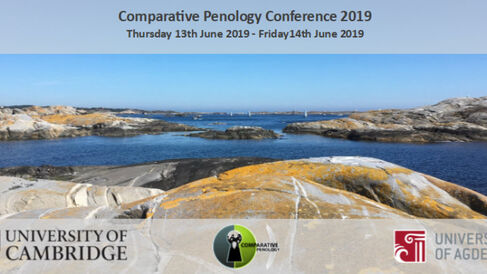COMPEN Conference

COMPEN Conference - University of Agder
On June 13th-14th, we hosted a conference at the University of Agder, Norway with the general theme ‘Punishment and imprisonment in the Nordic countries’. Researchers with expertise on prisons and punishment in the Nordic countries presented their analysis while our team discussed the ongoing findings from our comparative study of penal policymaking and prisoner experiences in England & Wales and Norway (https://www.compen.crim.cam.ac.uk/).
The starting point for our conference was that during the ten years that have passed since the ‘Nordic Exceptionalism’ thesis was first presented by John Pratt (2008ab), several important changes have occurred in Nordic penal policy and practice. This includes a significant growth in empirical prison research in this region, as well as penal policy developments that may seem to be in tension with the ‘Nordic Exceptionalism’ thesis. Following these developments, we asked: What do ten years of Nordic Exceptionalism research tell us about Nordic penal policy and practice? And in what ways do recent studies, and penal policy developments, support, challenge, and supplement the idea that Nordic prison policies and practices are unusually humane and inclusive?
Please see below the slides from the conference.
Welcome and introduction by Ben Crewe
Comparative Penology - Introduction slides
Exceptional punishment
The Nordic Exceptionalism debate has primarily centred around prisons and prison systems. However, punishment is far more than imprisonment. In this panel, we invite researchers to describe and analyse contemporary trends in Nordic punishment more broadly. To what degree is Nordic Exceptionalism relevant when considering punishment ideals and practices beyond the prison? This panel builds on socio-legal perspectives and to this end, panel participants will reflect on the ‘exportation’ of Nordic penal values and policies as well as Nordic court practices in relation to ethnic minorities.
Speakers:
- Louise Victoria Johansen, University of Copenhagen ‘The role of pre-sentence reports in court: Creating powerful knowledge about defendants’.
- Kjersti Lohne, University of Oslo‘Nordic Penal Humanitarianism.’
- Synøve N. Andersen, University of Oslo‘Challenges and Opportunities in Exporting Exceptional Punishment: Preliminary Observations from a Correctional Exchange Program.’
Radical hope, rituals and (dis)order - exploring prisoners’ experiences of release from prison in England & Wales and Norway
Speakers:
- Julie Laursen, Anna Schliehe and Kristian Mjåland
- Comments: Torsten Kolind, Universitety of Aarhus
Desistance from crime in ‘exceptional’ contexts
Research on desistance has been blossoming in the Anglo-Saxon field (see Bottoms & Shapland 2011; Nugent & Schinkel 2016; Maruna 2001), but to what degree are these analyses relevant when exploring desistance in Nordic countries? In this panel, we aim to facilitate discussions about what desistance looks like in ‘exceptional’ contexts. How much does the generous Norwegian welfare state alleviate the pains of debt, drug use and unemployment, and what factors help people to survive and thrive post-prison?
- John Todd, University of Olso‘Understanding desistance in Norway: discourses, practices and experiences.’
- Linnea Osterman, University of Greenwich ‘Comparative Lessons on Female Desistance: Sweden vs. England.’
- Marguerite Schinkel, University of Glasgow
Exceptionalism in exceptional places? Comparingdeep-end confinement in England & Wales and Norway
- Ben Crewe, Kristian Mjåland and Julie Laursen
- Comments: Sharon Shalev, University of Oxford
Inclusion and exclusion within and beyond the prison: Exploring the punishment of men convicted of sex offences in Norway and England & Wales
- Alice Ievins, Kristian Mjåland, Julie Laursen and Anna Schliehe
- Comments: David Hayes, University of Sheffield
Foreign nationals in Nordic prisons
In 2017, foreign nationals made up 34 percent of the Norwegian prison population and Kongsvinger prison is now a designated prison for foreign nationals. According to the World Prison Brief, the percentage of foreign nationals is somewhat lower in Denmark (29 per cent) and Sweden (22 per cent), but all three countries have seen a rapid growth in imprisoned foreign nationals. So far, most scholarship on this development has focussed on macro-theoretical explanations and analyses of the nation state (see Barker 2017). In this panel, we focus on empirically based work which emphasises foreign nationals’ own perspectives on Nordic imprisonment. How do prisoners experience the all-foreign national prison Kongsvinger? How do ethnic minorities experience imprisonment in Nordic countries? What do these experiences together tell us about exceptional penal practices?
- Torsten Kolind, Aarhus University
- An-Sofie Vanhouche, Vrije Universiteit Brussel ‘Not so exceptional after all? The experiences of foreign national prisoners in Norgerhaven Prison.’
- Louise Victoria Johansen, University of Copenhagen ‘Expecting punishment: Remand prisoners.’
Order, regulation and gender practices in women’s prisons in England & Wales and Norway
- Anna Schliehe, Julie Laursen, Alice Ievins and Kristian Mjåland
‘Nordic Exceptionalism 10 years on’ roundtable: What have we learned from ten years of Nordic Exceptionalism research?
The Nordic Exceptionalism thesis has been highly influential in creating interest in Nordic prison regimes specifically and comparative penology more generally. Now seems to be a good time to reflect upon what this case study of penal moderation has to offer the field of comparative penology. Has the NE-thesis and the research that has followed from it made it possible to grasp the penal practices in this particular region? What are the methodological lessons from ten years of debate and research into the NE-thesis? How can researchers avoid glamorising Nordic penal practices while simultaneously reporting truthfully about some of their advantages?
- Peter Scharff Smith, University of Oslo
- Victor Shammas, AFI, Oslo Metropolitan University
- Carina Gallo, San Francisco State University
- Berit Johnsen, KRUS
If you have any queries please contact us: compen.contact@crim.cam.ac.uk
